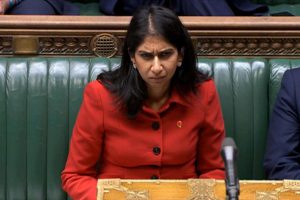By Matthew Paul
Thoughts and prayers for any Brexiters who wake up today from a coma, to find that we are still members of the European Union.
Once the news has sunk in, fans of the Prime Minister may regret our continued entrapment, but can console themselves with a miracle. The ditch is empty! He is not here; he is risen!
The PM’s resurrection contrasts with the final, stake-secured interment of the zombie Parliament. Voters won’t be sorry to see it go. However cynical the Boris/ Dom strategy of Brexity bluster and braggadocio, the opposition’s decision to block not only Boris’s Brexit,but any alternative to Brexit and also an election was not engaging public enthusiasm.
The opposition’s strategy of destroying Brexiters’ trust in Boris failed signally. When that became apparent, it was the LibDems and SNP who pulled the ripcord first. While Labour languish with poll ratings that would mildly embarrass ChangeUK, or indeed a putative Baby Eating Party, the Liberals and Scots Nats have got their tails up and are looking forward to a good scrap. If blocking Brexit didn’t banjax Boris, there was no reason for them to go on propping up Labour at their own expense.
His allies having thus ratted on the no-election pact, Jeremy Corbyn couldn’t keep running from the electorate. Pausing only for a pointless little squabble about the exact date –9 th or 12 th December– a large majority of MPs on Tuesday passed a one-line bill to circumvent the
Fixed Term Parliaments Act, to the effect that the Act would be ignored and an election would take place anyway.
Ignoring the law usually gets politicians into trouble with Baroness Hale, but this subversion of the FTPA is a useful reminder to people who complain that we are now ruled by the Supreme Court that in fact Parliament –as distinct from the executive– can actually do pretty much whatever it wants, and to Brexiters that this is what Parliamentary sovereignty is, and we already have it.
Unlike the SNP, Plaid Cymru were one of the tiny, surly minority to vote against holding a new election; partly in the forlorn hope that they might yet somehow leverage a second referendum, partly out of the troubled suspicion that Ben Lake could be for the chop in Ceredigion and their Brexity target seats in the valleys look hard for a Remain party to win in a Brexit election.
As Plaid recognise, all elections are fraught with risk. Labour will kid themselves that 2017’s great reversal of fortune can be replicated, brushing aside the minor qualification that they still lost that one, despite the worst Conservative campaign since Iain Duncan Smith asked
“are you thinking what we’re thinking?” and Britain answered “no.”
A repetition of 2017 is unlikely to happen. Theresa May was an unhappy and unwilling campaigner. The ‘strong and stable’ message was repetitive, banal and an insult to voters’ intelligence. Boris loves campaigning and it is what he and Evil Dom are best at. May had no particular reason, except her party’s calculated advantage, to go to the country. Boris has to deal with a country that has become ungovernable and a Parliament that has usurped the prerogative of the executive. May saw a few bouncy looking polls and got greedy. Boris has taken a necessary, unavoidable gamble. The electorate will show him more sympathy as a result.
The day after the election starting gun was fired, the Conservatives were polling 40%, with a clear 10% lead over Labour, who in turn had pulled a little back from the LibDems. A lead of 40% to 30% would win either main party a majority in any general election that has yet been held.
Even if the reality of an imminent choice and the prospect of five years of Boris pulls some on the left back to Labour, that party’s desertion by Remainers appalled at Corbyn’s prevarication over Brexit will split the centre-left vote and lead to Tory gains by default. The centre-right vote doesn’t look set to fragment in the same way. The entire ‘dead in a ditch’ strategy was designed to beat down Brexit Party support to the point where it looks unviable as a party of national opposition to the Tories.
In this, it appears to have prevailed. Even the toughest nuts and fruitiest fruitcakes in the Brexit Party are starting dimly to see the logic in not blocking Boris. Nigel Farage is in headlong retreat from his original intention to field one of his frightful waxworks in every constituency in mainland Britain, and is now contemplating dragging what he can from the fire by selectively targeting twenty or thirty gammon-red Labour-facing seats ‘oop North instead.
This election will be all about Brexit. Unfortunately for Remainers, as a proxy ‘People’s Vote’, it is hopelessly rigged against Remain. Corbyn will offer a second referendum, but if Corbyn were exclusively offering motherhood, apple pie and Christmas, moderate voters would still recoil in disgust. Jo Swinson is splendid, but however much damage she inflicts on Labour, she still won’t be Prime Minister. Many centre-right Remainers will hold their noses and (unless their Conservative candidate is Mark Francois or some similar golem) vote Tory.
As current polling stands, the Conservatives can aspire to a majority of around 60 seats. This would be enough to comfortably pass the Withdrawal Agreement Bill and move on to the next stages of Brexit, in which Brexiters –learning that there is no such thing as an easy trade deal with the USA, and that we will probably have to keep following all those foreign laws too– ask the nurse to give them something to send them back to sleep.
















Add Comment